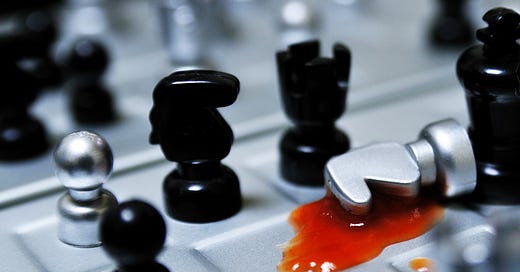This past Wednesday I was a guest on the podcast — recorded then, but yet to be released — Armchair Expert1. Near the end of the session Dax Shepard asked if the work of writing fiction changes my brain. He’d recently talked to a biographer who’d written about the chess player Bobby Fisher2. This expert proposed that Fisher might’ve been a bit paranoid, but that the long-term process of playing chess had escalated that paranoia to full-fledged debilitating levels.
The biographer said that Fisher’s constant awareness of being pursued and possibly defeated in game after game kindled that fear deeper into his neural pathways. By mentioning this, Dax was asking if the same were true for writers.
Know anyone struggling with their sanity?
Yes, writers always look for a big problem. We find a way to escalate and exaggerate that problem, and we bring that reality to as big a crisis as we can imagine. Then, we repeat the process, always looking for a bigger problem. A bigger crisis. Dax was asking, does that process eventually drive writers to Bobby Fisher levels of crazy?
In response I cited Stephen King, who says that he began to write because he was afraid of things. And that the longer he writes, he says, the more things he’s afraid of. Granted, this isn’t the most reassuring go-to, but I’d never considered the idea that writing — what Tom Spanbauer called “Dangerous Writing” — which so many people embrace as a therapy… might actually make us sick.
I’ve always wondered about insurance agents3. They’re always on the lookout for the next threat they can sell insurance against: fire, flood, accidents, earthquakes, identity theft. Does this slowly turn them into paranoid basket cases? And I use the term with affection; suicide and violence trickles down through both my parents. It’s known that my grandfather committed murder/suicide when he was 56 years old. Recently an aunt on my mother’s side told me that my maternal great-grandmother had also suffered. My maternal grandmother had had four siblings, and when she was very small three of those siblings died in quick succession from diptheria4. Upon the death of her third child, my great-grandmother sat her two surviving children at the kitchen table. She served them lunch and told them not to leave the table until their father got home. So my grandmother sat there for hours as her own mother went into the bedroom a few feet away and “died of a broken heart.”
My aunt was flabbergasted that I’d never understood that euphemism. “Died of a broken heart” is written on the death certificate, but what it meant was suicide5. She’d killed herself with her two surviving kids eating lunch in the next room6.
Still the question begs an answer. Does writing help you cope, or does it rewire your brain to make you crazier? Until Dax broached the subject I assumed that inventing chaos made me healthier and less reactive — like the psychological practice of “flooding” where you step into a room filled with snakes or spiders or whatever you fear most.
Now, thanks to Dax Shepard and Monica Padman, I’m not so sure.
Now I wonder if world-wide the overall culture might be falling into the same trap. Half of us always find the New World Order and GloboHomo as growing threats. Half find Right-Wing White Hegemony as the escalating threat. I find disaster because it’s the truffle I hunt. We all do. But maybe we’re all just stoking our own personal Bobby Fisher paranoia. What think you?
Look for the full Armchair Expert podcast in January. It was a blast.
If you can stomach a near-constant stream of bad news…
Otherwise…
The latest word is that Armchair will release this episode in January. Next week, look for me on Impact Theory, actually sitting in the same room as Tom Bilyeu. Breathing in his direction and everything.
Correction: The Impact Theory podcast is out now.
When Bobby Fisher won the world title against Boris Spassky in 1972, chess became a United States obsession. My grade school ran chess tournaments, and every kid played. We’d skip recess to practice chess, and half the school was crowded with chess sets. Kids waited in line to play, the way people flocked to play racquetball in the 80s. It’s tough to imagine, now.
Word is that The Queen’s Gambit is based on Fisher’s eccentric life and dramatic matches.
I also wonder if I reintroduced us to the word “mayhem,” in the form of Project Mayhem. When I first wrote the word into Fight Club it seemed archaic. Part of the fun was to use this old-fashioned word in relation to comic anarchy. Since then Allstate Insurance launched its Mayhem Campaign, using the remarkably handsome actor Dean Winters, complete with bruises and wounds suggestive of Edward Norton or Brad Pitt in the movie by David Fincher.
Once, I stumbled across the origin of the name “diphtheria.” It derives from the Greek word for leather or hide. The disease generates dead tissue that collects in a thick layer in the throat and nose, a “pseudomembrane” the ancient Greeks likened to leather, hence the disease’s name.
Call me obsessed. I can never get past how many comedies spring from the shadow of a dead parent. Or both parents. Even The Wizard of Oz is about an orphan. Even before the 70s (when the dead parent seemed a noble stand-in for the divorced parent) classic television was filled with dead mothers and fathers. Maybe, secretly, everyone’s life is ruined off screen, and we’re all gabbing along wittily lest we notice the corpse in the bedroom and break down weeping.
In The Brady Bunch the father is a widower. The mother was meant to be divorced, but that struck the producers as too skeevy. Instead, they vowed to never discuss the mother’s unmarried status, but inferred she was a widow. So much death! The Big Valley. My Three Sons. The Courtship of Eddie’s Father. One Day at a Time. Alice. Prime time was a graveyard of dead parents.
In old family photos, this great-grandmother — Lou White Remillard — is beautiful. And she never smiles.








In the past 20+ years I’ve lost 25 friends. Suicide, drug abuse, alcoholism, you name it. I’m always around it. When I turned 40 I found myself writing a story about the loss of so many people, not counting the hundreds of patients Ive taken care of who died.
In this I found it more therapeutic than anything else. It forced me to read and learn about death in a more academic sense rather than purely emotional. At first I thought I was going crazy with all the information I was gaining and retaining, but in all I feel less crazy now than before. But only because I went down the rabbit hole and came out unscathed.
The best book I’ve read on the subject of suicide, from an emotional and academic perspective was a book called, “why people die by suicide” by Thomas Joiner. It helped with thinking about what leads a person to commit suicide and to know how their suicide effected me and my future. Also the past and future of the character in my present project.
Sometimes I wonder about my 12-step work. It saved my life but there’s the belief in a higher power that’s going to make it ok and no “big deals” etc. but I do better when I write from a place of terror and desperation. Junkies always have good stories.